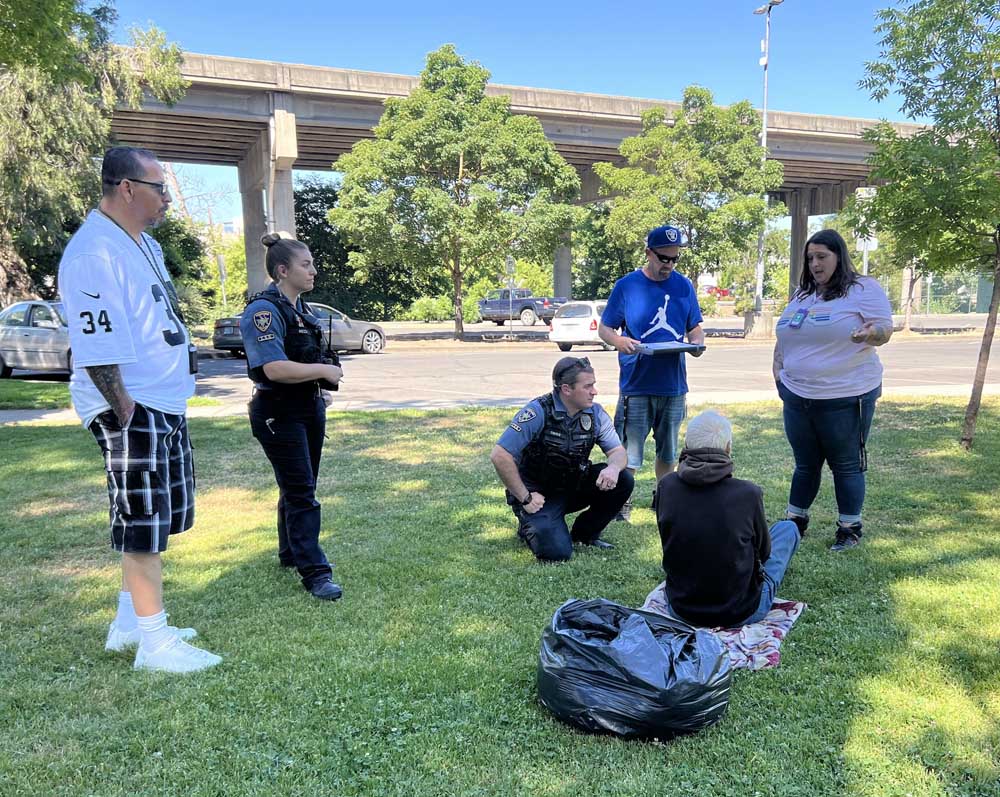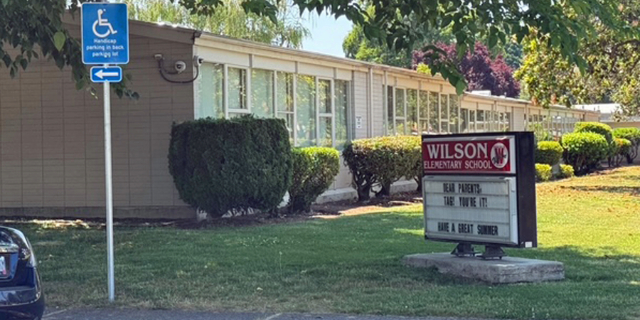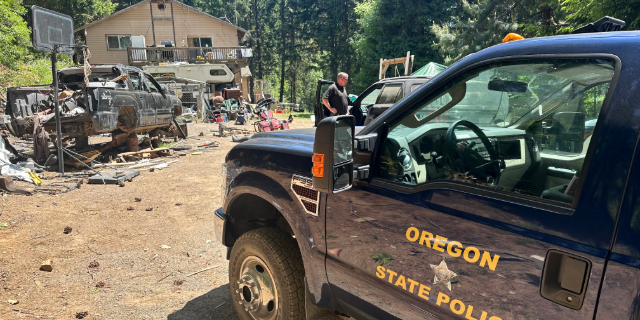New deflection program will start small, prioritize people on the Greenway
Published 1:00 pm Sunday, September 15, 2024

- The Medford Police Department's homeless outreach-focused Livability Team is leading the soft launch of Jackson County's new deflection program. The state-funded program starting next month brings together law enforcement, criminal justice, behavioral health and local treatment providers to incentivize a person facing criminal drug possession charges to have them dropped if they seek treatment.
People along the Bear Creek Greenway caught with small amounts of drugs will be among the first to be helped by a new Jackson County deflection program offering a path of resources and incentives to seek treatment.
Launching the first week of October, the program will bring together local law enforcement resources, mental and behavioral health resources and drug treatment resources for a team effort that drops criminal charges for people caught with user amounts of narcotics, such as methamphetamine or heroin, well before they reach the county district attorney’s office — but only if they meaningfully comply with certain treatment requirements.
Those treatment requirements, according to Eric Guyer, executive director of Addictions Recovery Center in Medford, include 10 “meaningful engagements” with treatment: five involving a licensed treatment counselor, and the remainder with certified peer counselors who are recovering addicts capable of walking the deflection candidate through the recovery process.
Guyer called peer engagement “the essential ingredient” in the new program. It helps people resistant to the idea of treatment forge connections, relationships and a sense of belonging.
“The intent is that this is the beginning of a long and continued recovery process,” Guyer said.
Jackson County Sheriff Nathan Sickler said a goal of the deflection program is to steer people interested in treatment away from the criminal justice system and into programs.
“It can take away some of the workload,” Sickler said.
Starting small
The program is starting small, but Sickler said that if the program is successful, it could eventually become available countywide.
He noted that the sheriff’s office makes “thousands and thousands” of contacts with individuals never involving the court system, such as traffic tickets, and he sees a future where the deflection program similarly steers the bulk of user drug-possession cases away from courts.
The gradual rollout of the program will allow the partners to “work out the kinks” and “make sure we can serve the individual.” Sickler voiced a concern that if early participants aren’t finding the help they seek, it could hamper the deflection program’s momentum down the line.
“We’re going to give it 100% and see where it goes,” Sickler said.
Jackson County’s program will be funded by a $1,148,016 Oregon Criminal Justice Commission grant, but unless the state legislature votes on the program in the upcoming session the funding will run out in June 2025. The CJC grant includes portions set aside for Jackson County Health & Human Services, the sheriff’s office, Medford police, Addictions Recovery Center and OnTrack Rogue Valley.
According to Jackson County’s application, released in an August state report, the deflection program launches Oct. 7 “with a focus on law enforcement contacts by the Medford Police Department’s Livability Team and Sheriff’s Office contacts with adults on our Greenway area.” The application states that referrals will go to the county’s deflection program coordinator, who will connect them with peer teams with provider partner agencies “for response, engagement and assessment.”
The grant funding comes from the Legislature’s passage of House Bill 4002 earlier this year, which reversed voter-approved Measure 110 and reinstated penalties for drug possession and separately authorized deflection programs funded by state grants but handled at the county level.
According to Jackson County’s application, released in an August state report, the deflection program launches Oct. 7 “with a focus on law enforcement contacts by the Medford Police Department’s Livability Team and Sheriff’s Office contacts with adults on our Greenway area.” The application states that referrals will go to the county’s deflection program coordinator, who will connect them with peer teams with provider partner agencies “for response, engagement and assessment.”
Much of the launch of Jackson County’s deflection program draws from the expertise of Medford police’s Livability Team, which since its launch in September 2019 has worked to connect unhoused people with addiction, behavioral health and other resources.
Medford police Lt. Rebecca Pietila, who manages the Livability Team, said that starting with her team was deemed a “natural connection” early on in the joint meetings with treatment providers and county officials after the passage of HB 4002 this spring. The Livability Team had been conducting warm handoffs with treatment providers for years.
“We still continue to do outreach twice a week,” Pietila said. “Really, this is in our wheelhouse.”
Jackson County’s program gives people offered deflection “an opportunity to engage with peer teams and take positive steps toward recovery over a 30-day period,” according to the county grant application. That window could be doubled to as much as 60 days in cases where the person’s engagement shows promise but they have lingering requirements.
She praised the multidisciplinary county program, and the way it draws from the expertise of treatment providers, the criminal justice system and Jackson County Health & Human Services to recognize accountability with the need for resources to get help.
Jackson County’s program gives people offered deflection “an opportunity to engage with peer teams and take positive steps toward recovery over a 30-day period,” according to the county grant application. That window could be doubled to as much as 60 days in cases where the person’s engagement shows promise but they have lingering requirements.
Pietila said another reason the program is ramping up gradually is that predicting demand for the deflection program is “tough to say” until it launches next month.
“The participant has to be willing to participate,” Pietila said. “We may have a very small number or a very large number.”
It’s unclear if the threat of reinstated criminal penalties will be enough to incentivize someone to engage in treatment through the deflection program, but she also understands that there are a lot of people in Jackson County interested in a path out of their drug problems.
“We may have a lot of opportunity,” Pietila said.
After deflection, ‘another bite of the apple’
If the candidate fails to comply with the terms of deflection, or if they outright refuse the offer, it goes to the district attorney’s office for prosecution. According to incoming DA Patrick Green, it will be up to program administrators to determine whether the person is complying.
Deflection is far from the only chance for a person with a user-level drug charge to seek treatment and avoid the penalty. Another option through the court system is what’s known as a conditional discharge program.
In the conditional discharge program, a person charged in Jackson County Circuit Court with user drug possession gets connected with drug treatment through a parole and probation officer. If the person is successful in the program, the charge is dismissed after 12 months.
“If somebody refused deflection they would still have the option of a conditional discharge,” Green said. “They get another bite of the apple, so to speak.”
Incoming Jackson County District Attorney Patrick Green said it’s too soon to tell how much the reinstatement of criminal penalties for user-level drug possession will impact the caseload at the district attorney’s office, but, he said, “I expect it to be significant. I think we’re still waiting and seeing.”
Those who outright refuse treatment options do face a criminal penalty, and the bulk of those will go to prosecutors. The initial stage of the deflection program maxes out at about 80 slots.
Possession of controlled substances such as methamphetamine or heroin is now an unclassified misdemeanor, which Green described as “a category of its own.” The crime carries a lower maximum jail sentence than a Class A misdemeanor — 180 days compared to a Class A misdemeanor’s 364 days — but is more severe than the lowest crime classification of a Class C misdemeanor.
Green said it’s too soon to tell how much the reinstatement of criminal penalties for user-level drug possession will impact the caseload at the district attorney’s office, but, he said, “I expect it to be significant.”
“I think we’re still waiting and seeing,” Green said.
Green said he appreciates how the program’s soft launch will allow it to more nimbly address issues that arise on a small scale.
“We’re going to have to see how the program goes,” Green said. “Just like Measure 110 was an experiment, this is an experiment, too.”
The maximum jail penalties for misdemeanor drug possession are unlikely considering that the Jackson County Jail, built in 1981, is continually at capacity. Sheriff Sickler said he is working with courts “to at least offer some accountability” for those sentenced to jail on the misdemeanor user-amount drug convictions.
Sickler said the jail’s hands are presently tied when it comes to new arrests for individuals on suspicion of user-amount drug possession. Owing to the bail reform laws passed under Senate Bill 48 — which earlier this summer was behind the swift release of two drug trafficking suspects caught with 276,000 illicit fentanyl pills near Ashland — suspects arrested on the charges would likely be released after processing.
“That’s another issue if we’re going to have accountability,” Sickler said.
Describing an ongoing shortage of public defenders locally and across the state, as well as Jackson County’s jail capacity crunch, Sickler described plans in the works to at least get authorization to hold a drug suspect long enough for them to make their initial circuit court appearance.
Program costs
The CJC’s new Behavioral Health Deflection Program is funding programs in 26 counties across the state, nearly all of which involve an “officer intervention” model. Combined, the total allocation for fiscal years 2023-’25 will be $20.7 million, including $1.14 million for Jackson County, $706,282 for Josephine County and $369,247 for Klamath County, according to the CJC.
Jackson County’s $1,148,016 grant includes $216,243.83 for personnel, $101,669 for housing and facilities, $85,167 for equipment, $79,519 for supplies, $40,000 for supplies, $521,100 in contractual services and $104,317.17 for administrative costs.
The contractural services break down to $87,533 for Medford police records management to assist Medford police in managing records to those charged in abeyance in the deflection program; $200,000 to Addictions Recovery Center for a two-person peer team and part-time supervisor to provide outreach and engagement to people in the deflection program; $133,567 for an OnTrack Rogue Valley peer team; and $100,000 for additional partner providers yet to be identified.
Governor speaks on deflection program, metrics for success
Presently, the deflection programs are optional, but Gov. Tina Kotek recommended to counties that had not yet begun planning a deflection program to begin doing so now.
“Counties who haven’t started, please start planning,” Kotek said in a Sept. 5 Zoom meeting with EO Media Group editors and reporters. “Look at the best practices, think about how you can do it.”
She said that she can see the Legislature down the line issuing a mandate to counties, in part, for data tracking purposes.
The programs vary from county to county, but as terms of the Behavioral Health Deflection grant, a requirement is participation in a statewide data collection system developed by Oregon Health and Science University’s data team that utilizes a web-based data-tracking platform known as REDCap.
“Counties and tribes must work with OHSU to submit data into that system,” a CJC Frequently Asked Questions document states.
During the Zoom meeting, the governor said she hopes the numbers reflect more exposure to programs than before.
“I think success will look like, ‘Did the individual who connected with law enforcement go to a treatment? Did they stay the course? Were they connected for a long enough fashion?'” Kotek said. “Any level of progress there is all for the better for those individuals.”







